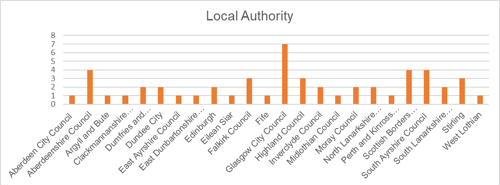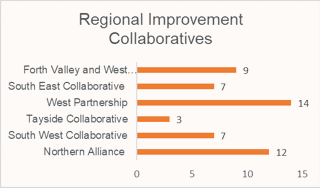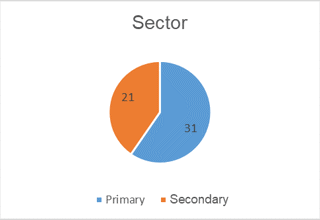Excellence in Headship Stretch
Headteacher agency for system change
Excellence in Headship Stretch (EiH Stretch) commenced in October 2019 as a strand within the Excellence in Headship programme.
EiH Stretch is designed to stretch and challenge headteachers seeking opportunities to create positive change in the Scottish education system. The programme explores the key elements of collaborative systems and aims to provide further development opportunities for 50 experienced headteachers from 24 Local Authorities to support their capacity to contribute to system leadership in an empowered system.
A major element of the programme is a collaborative professional enquiry around key areas of educational policy and theory identified by the group. The purpose of the enquiry is not simply to research and deepen shared knowledge but also to inform future action and improvement. The collaborative enquiry groups seek to nudge the system at the most appropriate level(s).
School leadership is a key driver for improvement. Evidence from the OECD and elsewhere demonstrates that leaders, at all levels, who are empowered and collaborative, and who empower others, are well placed to ensure the highest quality of learning and teaching. In an empowered school-led system, school leaders should be part of the collective leadership of the system, as well as leaders within their own organisation. The leadership skills required include: working across organisational boundaries; building shared values and trust; drawing on a wide range of perspectives and resources across systems to design local solutions; and reflecting local context, communities and aspirations.
An Empowered System – School Leaders July 2021



Key elements of the programme
Collaborative Enquiry
- EiH Stretch Induction facilitated by Education Scotland
- Collaborative enquiry
- 3 sessions on the concepts, process and practice of collaborative enquiry.
- CE groups have met together frequently and the PLL link has attended as requested.
- CE groups met with members of the PLL team to review plans, progress and discuss next steps.
- CE groups have made links with school leaders, local authorities, Education Scotland, academics and international contacts.
Big ideas
- EiH Stretch sessions on the ‘big ideas’ by leading academics
- The Myth of Poverty of Ambition, Professor Morag Traenor, Heriot Watt University
- Curriculum Making, Professor Mark Priestley, University of Stirling
- Headteacher Health and Wellbeing, Dr Karen Edge, University College London and Louka Parry, The Learning Future.
International links and contributions
- EiH Stretch participants were automatically given a place on the Education Scotland 20-21 International series of blethers and the majority of participants have taken up this opportunity. International and ICoEA partners including Paul Bloomberg and Peter de Witt from America, Simon Breakspear from Australia, Tri Nations colleagues from Scotland, Ireland and Wales, Jeni Donohoo and Carol Campbell from Canada, Alma Harris from Wales, Pasi Sahlberg from Finland, Steve Mumby from England, Avis Glaze and Andy Hargreaves from Canada and Kathryn McEwan and Fleur Johnston from Australia.
- CE groups held meeting with headteachers in Estonia and Australia.
- The CE Assessment group made links, through Professor Hayward, to the International Education Assessment Network.
- CE groups are meeting with headteachers in Slovenia. This has been facilitated by Education Scotland and National School of Leadership in Education (NSLE).
Coaching
- EiH Stretch Advanced Coaching was offered by Education Scotland.
- EiH Stretch participants were offered places on the CollectivEd Knowledge Exchange (Leeds Beckett University) Collaborative conversations which create powerful professional learning programme.
Collaborative Enquiry Questions
EiH Stretch participants were encouraged to consider a range of system issues and formed collaborative enquiry groups addressing the following aspects:
- How do we maximise the impact of pedagogy using digital learning?
- How might the assessment system evolve to better reflect both the aspirations of the curriculum, and 21st century skills, enabling all young people to demonstrate their full potential?
- In what ways can Head Teachers be empowered to work collegiately and efficiently to proactively influence decision making locally and nationally?
- To what extent does amplifying BME voices increase racial literacy within a school community?
- In what ways can professionals work together to ensure a better future for all?
- What Lessons have been Learned from the Global Pandemic in order to ‘Build Back Better’ for everyone?
- What systems changes need to take place for headteachers to enact their empowerment in a collaborative manner?
Scotland Listens
Throughout the challenging times of the global pandemic, headteachers from across Scotland have undertaken collaborative enquiries to identify and interrogate the big issues in Scottish education. This future-oriented study preceded the recent OECD report however the areas encapsulate and complement many of the themes and observations made within the report. Education Scotland, working in collaboration with the system to create agency for system change, invited leading stakeholders and policy makers to engage with their findings as part of ‘Scotland Listens: An opportunity to interact with the think pieces from the Excellence in Headship Stretch programme.
“In an empowered school-led system, school leaders should be part of the collective leadership of the system, as well as leaders within their own organisation. The leadership skills required include: working across organisational boundaries; building shared values and trust; drawing on a wide range of perspectives and resources across systems to design local solutions; and reflecting local context, communities and aspirations. Effective school leaders support cultures that welcome and foster teacher agency, supporting and enabling collaborative professionalism, including teacher-led professional learning.”
An Empowered System July 2021
Beyond Excellence in Headship Stretch
Developing a culture of empowerment is reliant on releasing true agency for all partners that play a role in improving outcomes for children and young people. This can be achieved through collaboration, co-creation and systemic trust.
A collective shared commitment and vision of the purpose of an Empowered System and what it can look like, can support communication, collective efficacy and interaction between partners. Thus enhancing coherence and fostering a joined up approach for all, which is needed, particularly when overcoming challenges that may arise. EiH Stretch is an example of agency in action, a way of making sense of empowerment.
True agency is achieved when partners draw on their own experience and context and work with others to use that information to direct, influence and make positive changes for improvement. A system that is fluid, responsive and listens to the needs of children and young people from a local, national and global perspective is key. EiH Stretch demonstrates what can be achieved when we work together in a climate of professional trust, holding each other accountable through trust as opposed to performance.
School Leaders working together to create networks of enquiry and professional learning contribute to the development an empowered culture which is essential for the success of an Empowered System.
Opportunities for participants to extend their experience and action their learning beyond EiH Stretch will be crucial. A range of pathways and opportunities will be explored, including how the headteachers can support and enrich national Professional Learning and Leadership, in addition to how they can build on their experience to continuously inform policy and influence system change.
Lead Specialists: Our role in facilitating Excellence in Headship Stretch
EiH Lead Specialists have acted as facilitators and connectors; signposting participants to relevant contacts, resources and networks, related to their area of collaborative enquiry. Through the exploration of collaborative enquiry we have supported our colleagues in developing a shared understanding of collaborative professionalism and enquiry. The communication of these Think Piece summaries is an important stage in this process as headteachers communicate their learning journey, findings and further
explore empowerment and headteacher agency.
Key Observations and Recommendations
Excellence in Headship Stretch Collaborative Enquiry Summary- Digital Learning
This Think-piece outlines the key findings emerging from a collaborative enquiry by seven secondary headteachers across five local authorities in Scotland. Their research extended locally, nationally and internationally in order to create a Scottish education system with strong digital pedagogy.
They used their own experience as early adopters of ICT and strong proponents of ‘pedagogy before product’ in blended learning approaches that are embedded in high quality teaching and learning and empower all learners equitably. The group debated and agreed what ‘good’ digital learning looks like and the importance within this of a clear framework for digital learning, high quality IT support and Scotland-wide connectivity.
View the Digital Learning Think Piece Here
Excellence in Headship Stretch Collaborative Enquiry Summary- Assessment
This Think-piece focuses on the learning from assessment practice in schools throughout session 2019/20 and 2020/2021 following the cancellation of SQA examinations. The Collaborative Enquiry Group included seven secondary headteachers widely spread across local authority areas in Scotland. Their enquiry was sparked by a desire to challenge existing structures and rethink assessment arrangements in order to build on the increased capacity of schools developed through the withdrawal of national exams. They saw the potential to re-imagine assessment methodology enabling young people to demonstrate their full potential. Headteachers observed assessment practices across the seven schools, made connections with the work of Professor Stobart and Professor Priestley and had discussions with academics and school leaders both in Scotland and abroad to inform and deepen their enquiry. They conclude with key areas of focus in achieving much needed change in the system.
View the Assessment Think Piece Here
Excellence in Headship Stretch Collaborative Enquiry Summary- Empowerment
This Think-piece explores the policy agenda in Scotland of Headteacher Empowerment. The Collaborative Enquiry group included six headteachers across five Scottish local authorities; primary and secondary schools and a community campus. Their focus was around the voice and involvement of headteachers in decision-making and system leadership locally and nationally. They conducted a series of semi-structured interviews with over forty stakeholders across Scotland and the UK and their findings are supported by extensive academic research by the group.
The enquiry identified lack of clarity in the term ‘Headteacher Empowerment alongside cultural and structural barriers limiting Empowerment in a system described as being ‘resistant to change’. They suggest how a strong culture of empowerment could facilitate Head Teachers to be strong stakeholders, and influence decision-making, in relation to the local and national agenda within Scottish Education.
View the Empowerment Think Piece Here
Excellence in Headship Stretch Collaborative Enquiry Summary- System Improvement
This collaborative enquiry focused on System Leadership and Improvement from the perspective of professionals working cross-system to support children and families. Three primary and secondary headteachers leading four schools in Scotland ask the question, ‘Is this working as effectively as it should?’. They looked nationally and internationally at practice around supporting children and young people, particularly those most at risk, and identified features necessary for more effective cross-service working highlighting that genuine and respectful collaboration across services was critical. They concluded that GIRFEC needs ‘a light shone on it’ as it was ‘not as aligned as it should be’ and that genuine system leadership needed to be underpinned by trust, respect and a high level of organisational, collaborative, social and intellectual capital.
View the System Improvement Think Piece Here
Excellence in Headship Stretch Collaborative Enquiry Summary- Equality and Diversity
This Think-piece focuses on increasing racial literacy within school communities. The Collaborative group, composed of headteachers in five diverse schools, enquired into how ‘divisive influences, bias and stereotypes’ identified in ‘The Coalition for Racial Equality and Rights’ affected equality in the context of their own school communities. They explored how teachers and school leaders could influence and improve this more strongly to ensure that all young people feel they have a voice and are confident within their place in school and society. They identified challenges in the confidence of teachers in accelerating progress in these areas and recognised the need to deepen racial literacy across the whole system.
View the Equality and Diversity Think Piece Here
Excellence in Headship Stretch Collaborative Enquiry Summary- School Recovery
This Think-piece is around lessons learned from the impact on school communities of the global pandemic. The role school leaders played in ‘lockdown’ particularly brought a spotlight to the critical importance of school at the heart of the community.
A group of five headteachers leading seven primary schools in different local authorities in Scotland collaborated on what the prevailing rhetoric of ‘building back better’ looked like across school communities. They shared positives gained during the COVID pandemic and discussed how these might be sustained for children, families, teachers and the school community. They investigated the risks and potential losses for particular groups within the education system in returning to ‘normal’.
Their enquiry into international educational research led them to scrutinise local, regional and national policy. They identified systemic blocks that can impact on schools meeting the diverse needs within their school communities. The collaborative group recognised ‘post-Covid’ as a chance to do things differently with an opportunity to influence the education system to genuinely ‘build back better’.
View the School Recovery Think Piece Here
Excellence in Headship Stretch Collaborative Enquiry Summary- System Collaboration
This Think-piece outlines the collaborative enquiry process and thinking of six primary headteachers, across five local authorities in Scotland. Their interest was around System changes needed for Headteachers to more fully enact their empowerment in a collaborative manner. Their research and comparison of the Scottish Education system to the highest performing countries led them to enquire into the reasons that Scotland lagged behind when many of the same systems appeared to be in place. They struggled with why, when Scotland has ‘fantastic vision’, performance was not improving sufficiently. They identified diluting factors such as: a ‘top-heavy support system’ with far too many layers between national policy and the classroom practitioner; lack of opportunity for teachers and leaders to reflect and collaborate; too much variation across 32 local authorities and a lack of coherence between the key bodies creating policy within the system. This Collaborative Enquiry group developed a strong collaborative culture through this process as they enquired and reflected deeper into these issues. Their work and collaboration continues…
